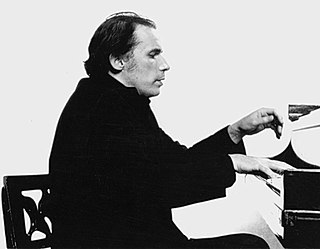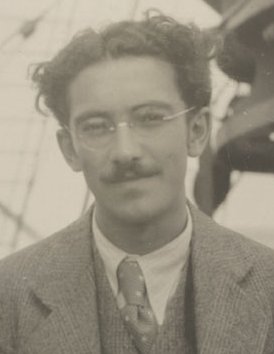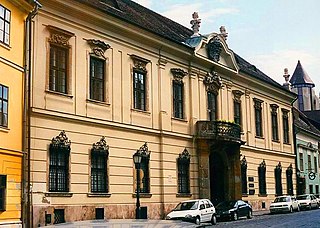
Glenn Herbert Gould was a Canadian classical pianist. He was one of the most famous and celebrated pianists of the 20th century, and was renowned as an interpreter of the keyboard works of Johann Sebastian Bach. Gould's playing was distinguished by remarkable technical proficiency and a capacity to articulate the contrapuntal texture of Bach's music.

Harry Stewart Somers, CC was a contemporary Canadian composer. Possessing a charismatic attitude and rather dashing good looks, as well as a genuine talent for his art, Somers earned the unofficial title of "Darling of Canadian Composition." Somers had engaged in many national projects over the course of his lifetime. He was a founding member of the Canadian League of Composers (CLC) and involved in the formation of other Canadian music organizations, including the Canada Council for the Arts and the Canadian Music Centre. He frequently received commissions from the Canadian Broadcasting Corporation and the Canada Council for the Arts.

Murray Adaskin, was a Toronto-born Canadian violinist, composer, conductor and teacher. After playing violin with a band, he studied composition and became the director of the Music department of the University of Saskatchewan. Many of his compositions were written while in Victoria after his retirement.

In Canada, classical music includes a range of musical styles rooted in the traditions of Western or European classical music that European settlers brought to the country from the 17th century and onwards. As well, it includes musical styles brought by other ethnic communities from the 19th century and onwards, such as Indian classical music and Chinese classical music. Since Canada's emergence as a nation in 1867, the country has produced its own composers, musicians and ensembles. As well, it has developed a music infrastructure that includes training institutions, conservatories, performance halls, and a public radio broadcaster, CBC, which programs a moderate amount of Classical music. There is a high level of public interest in classical music and education.
John Jacob Weinzweig, was a Canadian composer of classical music.
Harry Freedman , was a Canadian composer, English hornist, and music educator of Polish birth. He wrote a significant amount of symphonic works, including the scores to films such as The Bloody Brood (1959), Isabel (1968), The Act of the Heart (1970), The Pyx (1973) and The Courage of Kavik the Wolf Dog (1980), and composed a substantial amount of chamber music. He also composed music for six ballets, an opera, some incidental music for the theatre, and a few vocal art songs and choral works. He was awarded a Juno Award in 1996 for his symphonic work Touchings, which was recorded by the Esprit Orchestra on the Nexus label. He won the 1998 composition prize at the International Rostrum of Composers for Borealis, a symphonic work co-commissioned by the Toronto Symphony Orchestra, Soundstreams Canada, and CBC Radio. In 2002 the Canadian Music Centre released a commercial recording dedicated to his music, Canadian Composers Portraits: Harry Freedman.
John Beckwith was a Canadian composer, writer, pianist, teacher, and administrator.

Budapest has long been an important part of the music of Hungary. Its music history has included the composers Franz Liszt, Ernő Dohnányi, Zoltán Kodály and Béla Bartók and the opera composer Ferenc Erkel.
The Tucson Symphony Orchestra, or TSO, is the primary professional orchestra of Tucson, Arizona. Founded in 1928, when the season consisted of just two concerts, the TSO is the oldest continuously running performing arts organization in the Southwest. The TSO's season now runs from September to May and consists of over 60 concerts, including a Classics Series of eight programs, a Pops Series of four programs, a Masterworks series of five chamber orchestra programs, a number of one-night only specials, and run-out concerts to surrounding areas, such as Oro Valley, Green Valley, Bisbee, Safford, Thatcher, and Nogales. The TSO also provides educational programming that reaches over 40,000 school children each season. Within the TSO are a number of standing chamber ensembles, including a string quartet, string quintet, piano trio, harp trio, brass quintet, and woodwind quintet. These ensembles help provide educational programming through school visits, perform recitals annually, and also perform at private and community events.
Marjan Mozetich is a Canadian composer who has written music for theatre, film and dance, as well as many symphonic works, chamber music, and solo pieces. He has written compulsory competition pieces for the 1992 Banff String Quartet Competition and the 1995 Montreal International Music Competition. Co-founder of Arraymusic in Toronto, Mozetich served as their artistic director from 1976 to 1978. After his work with Array, he worked for some time at the University of Toronto music library, and he then became a freelance composer. Mozetich moved to Howe Island, near Kingston, Ontario, and taught composition at Queen's University in Kingston from 1991 to 2010. He has won several awards, including the first prize in the CAPAC (SOCAN)-Sir Ernest MacMillan Award. His major compositions include Fantasia... sul linguaggio perduto, and Postcards from the Sky.
Samuel Joseph Dolin was a Canadian composer, music educator, and arts administrator. An associate of the Canadian Music Centre and a founding member of the Canadian League of Composers (CLC), he served as the CLC's vice president from 1967 to 1968 and president from 1969 to 1973. He was also vice-president of the International Society for Contemporary Music (ISCM) from 1972 to 1975 and chairman of the ISCM's Canadian Chapter from 1970 to 1974. From 1945 to 2001 he taught music composition, music theory, and piano at The Royal Conservatory of Music where he trained dozens of notable Canadian composers.
Fred Stone was a Canadian flugelhornist, trumpeter, pianist, composer, writer, and music educator. He worked as a soloist within both the classical and jazz repertoires from the 1950s through the early 1970s, appearing in concerts with the Duke Ellington Orchestra, the Toronto Symphony Orchestra, the Winnipeg Symphony Orchestra, the Detroit Symphony Orchestra, the Cleveland Orchestra, the Buffalo Philharmonic Orchestra, the Ottawa Symphony Orchestra, and the San Diego Symphony. Between 1971 and 1983, he mainly focused on his work as a composer and teacher, making only periodic public performances, and often with ensembles composed largely of his students. In 1984, he formed "Freddie's Band", a jazz ensemble in residence at The Music Gallery in Toronto. He performed with this group up until his death two years later.
Jack Kane was a Canadian arranger, conductor, clarinetist, and composer of English birth. He lived in Toronto, Ontario with his wife Clare and their children. His 1958 recording Kane is Able was nominated for a Grammy Award for Best Performance by an Orchestra or Instrumentalist with Orchestra. He was highly active as an arranger and music director for Canadian television during the 1950s. His career was cut short by his death from cancer at the age of 36. The Canadian Encyclopedia states, "At the time of his death, Kane was considered one of Canada's leading arrangers. He later was honoured by a Canadian Talent Library Trust LP of his big band arrangements, under the direction of Bert Niosi."
Norma Marian Beecroft is a Canadian composer, producer, broadcaster, and arts administrator. A member of the Canadian League of Composers and an associate of the Canadian Music Centre, she twice won the Canada Council's Lynch-Staunton Award for composition. She has been commissioned to write works for such organizations as the Atlantic Symphony Orchestra, the Canadian Broadcasting Corporation, the Canadian Electronic Ensemble, The Music Gallery, the National Arts Centre Orchestra, the National Ballet of Canada, the Quebec Contemporary Music Society, the Toronto Symphony Orchestra, and York Winds among others. She is an honorary member of the Canadian Electroacoustic Community and has served on the juries of the SOCAN Awards and the Jules Léger Prize for New Chamber Music. In 1988 she donated many of her original manuscripts, papers, and recordings to the library at the University of Calgary.
John Fodi was a composer and music librarian. Born in Hungary, he became a naturalized Canadian citizen in 1961. An associate of the Canadian Music Centre, he was a founding member of ARRAYMUSIC, an organization which premiered several of his compositions.
Rudy Toth was a Canadian composer, arranger, conductor, pianist, and cimbalom player of Czech birth. As a composer he wrote works mainly for television and the radio, working frequently for the Canadian Broadcasting Company for over three decades. As a pianist he performed in a number of jazz and dance bands in Toronto and played for radio productions at the CBC. For many years he was active as a concert cimbalon player, appearing as a soloist with symphony orchestras in both Canada and the United States.
Ben Steinberg was a Canadian composer, conductor, organist, and music educator. A member of the Canadian League of Composers and an associate of the Canadian Music Centre, he is known for his contributions to Jewish music. He has presented many programs of Jewish music for the Canadian Broadcasting Corporation and has presented similar programs in lecture-recitals throughout Canada, the United States, Australia, and Japan. He has also contributed articles on Jewish music to a number of publications. Several of his original manuscripts and papers are held in the collection at the library of the University of Calgary.
James Louis Montgomery is a Canadian music composer, performer, and arts administrator. For about 20 years he was the artistic director of The Music Gallery. He is also a founding member of the Canadian Electronic Ensemble with whom he performs and records. As a composer he is known for incorporating electronic technology into his works.

Frances Elaine Keillor C.M. is a Canadian musicologist and pianist. She has been a professor of music at Carleton University since 1977, specializing in the music of Canadian composers and the music of North American indigenous groups.
Evelin Ramón is a prominent Cuban composer and singer.





